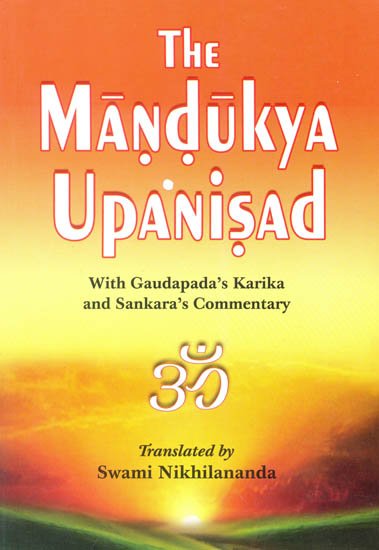Mandukya Upanishad (Gaudapa Karika and Shankara Bhashya)
by Swami Nikhilananda | 1949 | 115,575 words | ISBN-13: 9788175050228
This is verse 1.25 of the Mandukya Karika English translation, including commentaries by Gaudapada (Karika), Shankara (Bhashya) and a glossary by Anandagiri (Tika). Alternate transliteration: Māṇḍūkya-upaniṣad 1.25, Gauḍapāda Kārikā, Śaṅkara Bhāṣya, Ānandagiri Ṭīkā.
Mandukya Karika, verse 1.25
Sanskrit text, IAST transliteration and English translation
युञ्जीत प्रणवे चेतः प्रणवो ब्रह्म निर्भयम् ।
प्रणवे नित्ययुक्तस्य न भयं विद्यते क्वचित् ॥ २५ ॥yuñjīta praṇave cetaḥ praṇavo brahma nirbhayam |
praṇave nityayuktasya na bhayaṃ vidyate kvacit || 25 ||25. The mind should be unified with (the sacred syllable) Aum. (For) Aum is Brahman, the ever-fearless. He who is always unified with Aum knows no fear whatever.
Shankara Bhashya (commentary)
The word Yuñjīta means to unify, i.e., to absorb. The mind should be absorbed in Aum, which is of the nature of the Supreme Reality, as explained before. The Aum is Brahman, the ever-fearless. He who is always unified with Aum knows no fear whatever; for the Śruti says, “The knower of Brahman is not afraid of anything”.
Anandagiri Tika (glossary)
He who is proficient or perfect in the knowledge of Aum, acquired by an enquiry into its parts, i.e., he who has unified himself with the soundless (partless) Aum by merging the three sounds in it, has annihilated the entire dualistic illusion and thereby attained to the supreme goal. But those who cannot do so and those who always depend upon the teachings of others for acquiring knowledge, should meditate upon Aum in the manner described in the Śruti.
